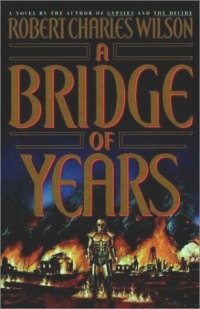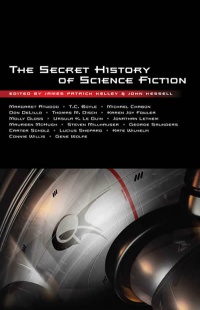The place you stand is always the present and that’s all you ever really have — I don’t think that’s a bad thing.
Title: A Bridge of Years
Author: Robert Charles Wilson
Year: 1991
Rating: 4 out of 5 stars
 I plan to eventually read every novel Robert Charles Wilson has written, and I’m slowly working my way toward that goal. This time I’ve gone back a little in time (yes, that is a pun) to one of his earlier ones, A Bridge of Years. The title is to be taken literally — this is a time travel novel. However, it’s not what you might think of as a typical time travel novel. The book is less concerned with the time traveling phenomenon itself (explanations of the technology, changes to the past, time paradoxes and all that), and more focused on a small group of characters and the way this time bridge affects their lives. When some of them see this discovery as a means of escaping an intolerable existence, they set themselves up for a lesson about past, present, and future; they learn that your life follows you wherever you go, and you can’t escape it so easily.
I plan to eventually read every novel Robert Charles Wilson has written, and I’m slowly working my way toward that goal. This time I’ve gone back a little in time (yes, that is a pun) to one of his earlier ones, A Bridge of Years. The title is to be taken literally — this is a time travel novel. However, it’s not what you might think of as a typical time travel novel. The book is less concerned with the time traveling phenomenon itself (explanations of the technology, changes to the past, time paradoxes and all that), and more focused on a small group of characters and the way this time bridge affects their lives. When some of them see this discovery as a means of escaping an intolerable existence, they set themselves up for a lesson about past, present, and future; they learn that your life follows you wherever you go, and you can’t escape it so easily.
The novel starts off in the year 1989. After a painful divorce and a period of alcoholism, Tom Winter moves back to the small town on the northwest American coast where he spent his childhood. Looking for some quiet and solitude in which to rebuild his shattered life, he buys a house in the semi-rural area outside of town. The previous owner of the house mysteriously disappeared ten years ago, and as Tom settles in he discovers other mysteries about his new home — such as the fact that it seems to be self-cleaning and self-repairing. Not to mention the tunnel leading out of the basement, a tunnel that ends, incredibly, in New York City and, just as incredibly, in the year 1962.
The house is one of a series of terminals stretching back in time from the far future, each set of stations bridging a gap of several decades or so. The question of who built them, and why, is only addressed in a peripheral way. The story is not about those enigmatic far-future beings, although there are tantalizing hints here and there. No, this is a story about two men who make the mistake of seeing this time tunnel as their salvation, as a way to transform their lives, as a way to leave behind all the negative baggage of their past. Tom sees the Sixties as a simpler, more innocent time in which to live, a place to start over and find new love. But this simplistic dream is destroyed when he finds out he’s not the only person to follow the same escape route. Sharing this earlier New York with him is Billy, a super-soldier from the late 21st century trying to escape the twin horrors of war and ecological disaster. Unfortunately, Billy has been altered by the military technology of his time; he was fitted with special armor that is a part of him, that regulates and controls his hormones, and that he can’t live without. And his armor tells him Tom Winter is a threat, come to punish him for deserting the army….. uh oh.
The book works extremely well on the character level, and the plot is tense and well-constructed. And throughout the book are some interesting perspectives on the nature of time. For instance, Tom wonders about whether or not the 60’s, 70’s, and 80’s will play out the same way they did “before,” and eventually is persuaded to this view:
I think the future is something like a big building in the fog — you know it’s there, and you can grope your way toward it, but you can’t be sure about it until it’s close enough to touch.
Tom also comes to realize that the past is not simply a set piece or prop, not some idealized fantasy, but a place with its own gritty reality, both good and bad:
[…] the only way you can own the past is by respecting it — by not turning it into something quaint or laughable or pastel or bittersweet. It’s a real place where real people live. And the future is real because we’re building it out of real hours and real days. No world out of the world, Tom thought. No Eden, no Utopia, only what you can touch and the touching of it.
This is a fine novel, and a unique and mature take on the time travel theme. I’d expect nothing less of Wilson.

 I plan to eventually read every novel Robert Charles Wilson has written, and I’m slowly working my way toward that goal. This time I’ve gone back a little in time (yes, that is a pun) to one of his earlier ones, A Bridge of Years. The title is to be taken literally — this is a time travel novel. However, it’s not what you might think of as a typical time travel novel. The book is less concerned with the time traveling phenomenon itself (explanations of the technology, changes to the past, time paradoxes and all that), and more focused on a small group of characters and the way this time bridge affects their lives. When some of them see this discovery as a means of escaping an intolerable existence, they set themselves up for a lesson about past, present, and future; they learn that your life follows you wherever you go, and you can’t escape it so easily.
I plan to eventually read every novel Robert Charles Wilson has written, and I’m slowly working my way toward that goal. This time I’ve gone back a little in time (yes, that is a pun) to one of his earlier ones, A Bridge of Years. The title is to be taken literally — this is a time travel novel. However, it’s not what you might think of as a typical time travel novel. The book is less concerned with the time traveling phenomenon itself (explanations of the technology, changes to the past, time paradoxes and all that), and more focused on a small group of characters and the way this time bridge affects their lives. When some of them see this discovery as a means of escaping an intolerable existence, they set themselves up for a lesson about past, present, and future; they learn that your life follows you wherever you go, and you can’t escape it so easily.













